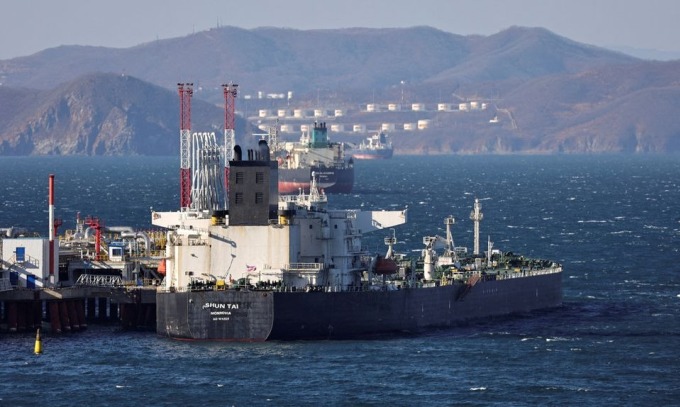Russian oil companies are enjoying the cheapest shipping rates to China and India in a year, thanks to the increasing number of tankers running the route.
The emergence of new non-Western shipping lines has allowed Russian companies to sell above the $60-a-barrel price ceiling imposed by the United States and its allies late last year, meaning the price cap will have a limited impact on Moscow’s revenues.
On October 12, the US imposed its first sanctions on two Russian oil tankers whose purchase prices exceeded the ceiling. One is based in Türkiye and the other in the United Arab Emirates (UAE). This is to close a loophole in the sanctions regime against Moscow.
In December 2022, the G7 banned shipping lines and insurers in member countries from providing services for Russian oil exports if the selling price exceeds $60 a barrel. This ban does not apply to companies from other countries.
When the ban was imposed, most of the vessels involved were Western. If oil prices had exceeded $60, sanctions would have severely impacted Russian exports. However, Russian oil prices did not exceed that level until July this year, meaning Russian traders, shipping lines, and oil companies had months to prepare for the sanctions.
In recent months, traders have been actively collecting old tankers for shipping. Many other tankers are registered in countries that have not imposed sanctions on Russia.

An oil tanker at the port of Kozmino (Russia) in December 2022. Photo: Reuters
The number of underground oil tankers (with unknown owners) has reached 535, with an average age of 23 years, according to analysis by shipping tracker Lloyd's List Intelligence. They revealed that two-thirds of these vessels have no insurance data.
“As long as governments see these services as a policy tool to control commerce, there will be people who will find ways to do it without breaking the law,” Mike Salthouse, director of external affairs at insurance firm NorthStandard, told Reuters.
So many ships are willing to carry Russian oil that shipping rates have fallen, boosting revenues for Russian oil companies. Traders selling Russian oil have saved $7 a barrel in shipping costs this fall compared to when the new price cap was imposed, according to calculations by Reuters and trading houses.
That means exporters are getting about $70 a barrel for the oil they ship from the Baltic ports. When oil prices peaked at $97 a barrel in September, Russian oil companies were reportedly earning $79 a barrel.
Freight rates for shipping Russian Urals crude to Asia have also fallen to their lowest since the price cap was imposed this month, traders said. The cost of chartering a 100,000-ton ship from a Baltic port to India is now $4.8 million to $5.2 million (about $7 a barrel), compared with more than $15 million (about $14 a barrel) earlier this year.
Shipping prices also fell after Russia announced it would cut oil exports by 300,000 barrels a day to support the oil market along with Saudi Arabia. However, Russia has still exported nearly 5 million barrels a day of crude this year. The International Energy Agency (IEA) estimated on October 12 that Russia exported 7.6 million barrels a day of both crude and oil products in September.
The cost of shipping 140,000 tonnes of Urals oil from the Black Sea port of Novorossiysk to India has also dropped to $4.1-$4.2 million per trip this month, Reuters reported, citing shipping sources. That price was $5 million in the summer.
Ships registered in the Middle East, Africa, China, Latin America and even Russia are operating on the route. "We have seen some new names on the list of oil tankers," Reuters quoted a source familiar with the matter as saying.
Western officials have so far maintained that the price cap has worked, even though Russian oil companies are selling for more than $60 a barrel. They argue that without sanctions, Russian oil would be more expensive and that Russia now has fewer customers and fewer suppliers.
In addition, the US and its allies said they were imposing a price cap to prevent disruptions in the oil market, which pushed prices even higher. Early last year, Brent crude approached $140 a barrel amid speculation the US might ban Russian oil imports. Currently, Brent is trading around $88 a barrel.
Ha Thu (according to Reuters)
Source link



































































































Comment (0)